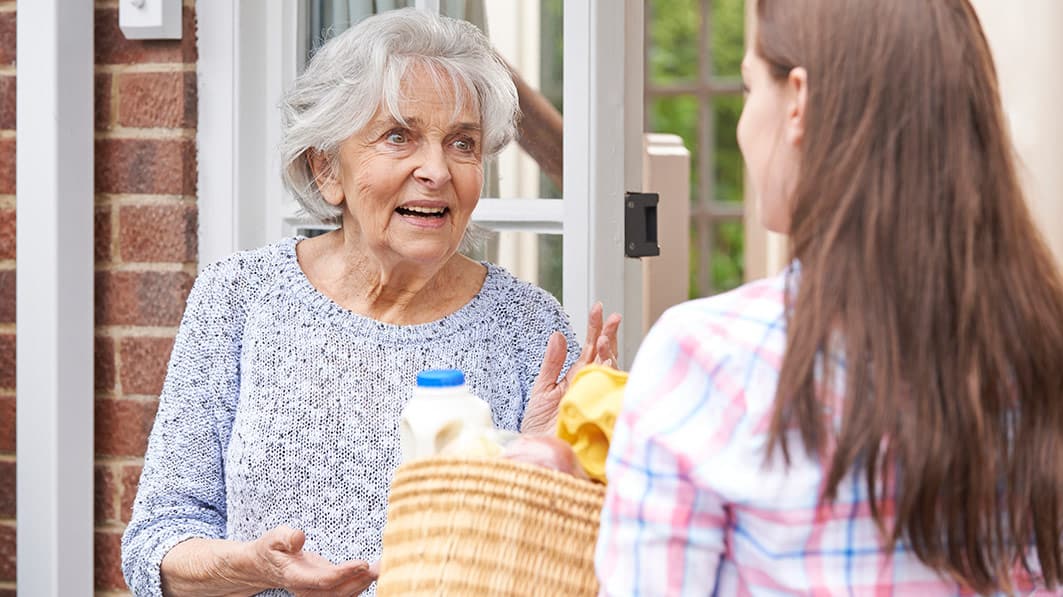I first met Margaret at the community mailbox when she mentioned that she’d seen my kids playing outside. So we began talking. Margaret shared that she was a recent widow, and as she spoke, I recognized unmistakable anger in her voice. She was angry about her husband’s death. Angry at his cancer, at the doctors. She even seemed angry at her husband for not reporting his symptoms earlier.
Still, when we parted ways, I felt like I’d made a friend. A thorny, prickly friend, it seemed, but a friend nonetheless. Before we even arrived in the neighborhood, we’d been praying for opportunities to share Christ’s love. We’d prayed specifically for the people who would live on our street. From the first time I met Margaret, I felt God’s love for her welling up in my heart.
Soon afterward, the kids and I crossed the street and delivered a loaf of homemade bread. Margaret seemed grateful and invited us in. Sitting in her living room, Margaret told us more of her story, while the grandfather clock ticked off the minutes.
Our relationship continued this way for a while. We’d stop by Margaret’s house, usually with a plate of cookies or bars. Sometimes we’d see her walking her dog, Miffy, or checking the mail, and we’d stop to chat. Margaret told us about city ordinances that made her upset, various neighbors who frustrated her and why she refused to set foot in a church. Her negativity was often repellant, but I felt compelled to continue reaching out to her. Was there anyone else I could think of who more desperately needed God’s love?
One day, as we were talking about a neighborhood musician, Margaret offered to loan me one of her CDs. It was the first time she had given me anything, and I felt honored. But life in a bustling household passes quickly, and two weeks had passed without me having a chance to enjoy the CD.
Then there was a knock at my door. Dressed in military fatigues, a stout young woman with cropped hair and a stern face said, “My grandmother needs her CD back.”
I vaguely recognized her as Margaret’s granddaughter, who sometimes checked in on her.
“No problem. I’ll get it.”
The woman took the CD and walked away without another word.
The next day I called Margaret to apologize for not returning her CD right away, but Margaret interrupted me with a harsh tongue-lashing that instantly earned my day a PG-13 rating. Before I could recover, she hung up.
I was stunned. I’d had no idea she’d wanted the CD back right away. That time had flown by for me, and I felt terrible to neglect and disrespect.
Time passed. We no longer chatted outside by the mailbox or in Margaret’s living room. The times I’d catch a glimpse of her, she would quickly turn and walk away.
Before long it was Christmas. I wondered if Margaret would be doing anything special. I knew her granddaughter was one of the only family connections not destroyed by her anger and unforgiveness, and she was often away on assignment.
I decided to take a risk. On Christmas morning, our family bundled up and crunched across the snow-packed street to Margaret’s front porch. Her mouth dropped open when she saw our family standing there with a plate of cinnamon rolls. We didn’t stay long, but I saw tears in Margaret’s eyes when she said goodbye.
Not long after, Margaret was on our doorstep. As we talked, she admitted to needing help, explaining that certain chores were proving difficult these days, and that short-term memory loss was giving her occasional confusion in her walks around the neighborhood. And so, over the next year, our family recommitted to our quirky relationship with Margaret. We helped where we could in the various tasks of her life, in the little jobs around the house. We continued to pray for her, and sought every opportunity to share the love and truth of Jesus with her.
Through it all, Margaret was mostly still Margaret—anger and all. And while we didn’t live near Margaret long enough to see her heart turn to God, I’m convinced she at least tasted God’s love for her—through the little everyday interactions with our family.
Reaching Out to Elderly Neighbors
From my relationship with Margaret, I began to learn more about the needs of isolated seniors in my community. Here are some tips for serving aging adults in our communities:
Stay on the lookout
Keep an eye on the house and watch for unmet needs. As part of chores, teach your kids to shovel a senior’s driveway, rake leaves or haul garbage cans to the curb without being asked.
Open doors
Periodically invite your neighbor for a meal, a small dessert or even just a cup of coffee. Include your neighbor in little family events such as barbecues or backyard campfires. Even just a walk down the street can be a welcome diversion.
‘Can I help?’
Offer to assist with tasks around the home and around town — from swapping out burnt out light bulbs to running errands and picking up a few groceries from the store.
Extend nice surprises
Share small gifts or goodies on special holidays — or just during the week for no reason at all. Ask questions about your neighbor’s life and history — and take the time to listen!
Include the little ones
Let your neighbor enjoy your children or pets (in manageable doses), if he or she is willing. Invite your neighbor to come with you to school performances or church functions.
Be a light
Share the love of Jesus in everyday conversations. As a family, pray regularly for your neighbor’s salvation or spiritual growth. Do whatever you can to connect your neighbor to a church community.




















